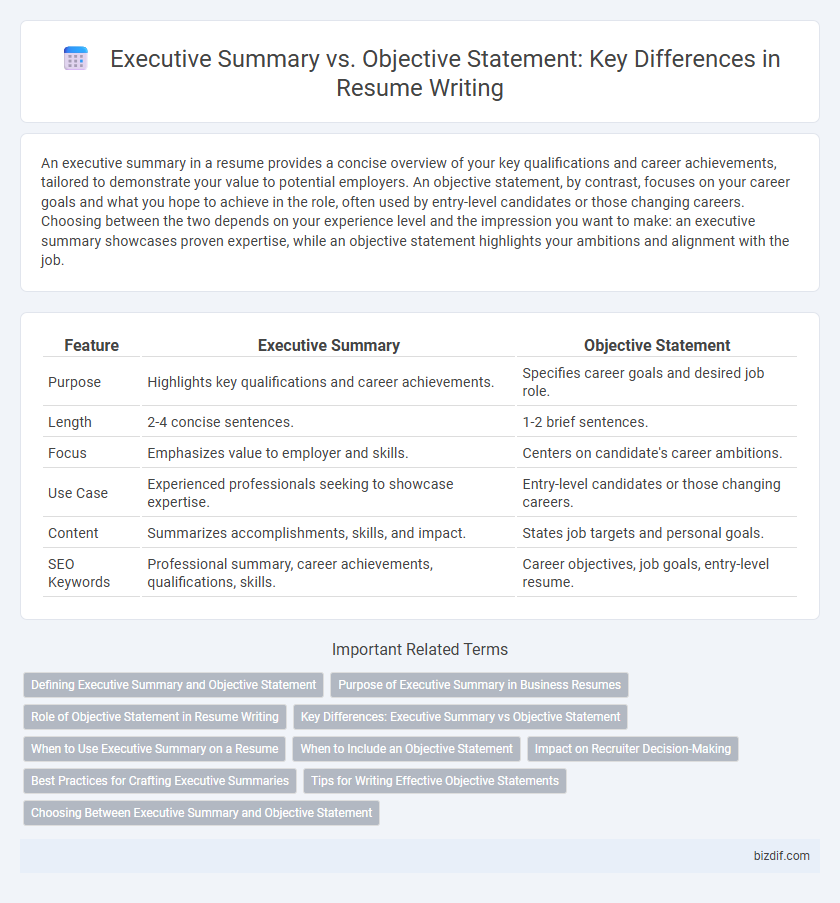An executive summary in a resume provides a concise overview of your key qualifications and career achievements, tailored to demonstrate your value to potential employers. An objective statement, by contrast, focuses on your career goals and what you hope to achieve in the role, often used by entry-level candidates or those changing careers. Choosing between the two depends on your experience level and the impression you want to make: an executive summary showcases proven expertise, while an objective statement highlights your ambitions and alignment with the job.
Table of Comparison
| Feature | Executive Summary | Objective Statement |
|---|---|---|
| Purpose | Highlights key qualifications and career achievements. | Specifies career goals and desired job role. |
| Length | 2-4 concise sentences. | 1-2 brief sentences. |
| Focus | Emphasizes value to employer and skills. | Centers on candidate's career ambitions. |
| Use Case | Experienced professionals seeking to showcase expertise. | Entry-level candidates or those changing careers. |
| Content | Summarizes accomplishments, skills, and impact. | States job targets and personal goals. |
| SEO Keywords | Professional summary, career achievements, qualifications, skills. | Career objectives, job goals, entry-level resume. |
Defining Executive Summary and Objective Statement
An Executive Summary in a resume provides a concise overview of a candidate's key achievements, skills, and professional background, tailored to align with the job role and industry. An Objective Statement clearly defines the candidate's career goals, outlining what they aim to achieve in the targeted position or organization. While the Executive Summary emphasizes value and experience, the Objective Statement focuses on the applicant's aspirations and intent.
Purpose of Executive Summary in Business Resumes
The Executive Summary in business resumes highlights key career achievements and leadership skills to quickly convey the candidate's value proposition to potential employers. It provides a concise overview of professional expertise, quantifiable results, and strategic impact, helping hiring managers assess suitability for executive roles. Unlike an Objective Statement, it focuses on past successes and contributions rather than future goals.
Role of Objective Statement in Resume Writing
The Objective Statement in resume writing serves to clearly communicate a candidate's career goals and intentions to potential employers, aligning personal aspirations with the job role. It provides a focused snapshot of the applicant's immediate professional objectives, which helps recruiters quickly assess fit for entry-level or career-change positions. This concise statement enhances resume relevance by targeting the specific role and industry, increasing the chances of capturing employer interest early in the hiring process.
Key Differences: Executive Summary vs Objective Statement
An Executive Summary in a resume highlights key achievements, skills, and professional experience tailored to the job, providing a snapshot of qualifications and value to the employer. An Objective Statement focuses on the candidate's career goals and what they aim to achieve in the position, often emphasizing their ambitions rather than specific accomplishments. The Executive Summary is result-oriented and employer-focused, while the Objective Statement is goal-oriented and candidate-focused, making the summary more effective for experienced professionals.
When to Use Executive Summary on a Resume
An Executive Summary on a resume is best used by experienced professionals aiming to highlight key achievements and leadership skills in a concise format. It effectively showcases strategic impact and career progression for roles such as executives, managers, and senior specialists. Use an Executive Summary when applying for high-level positions to provide hiring managers with a clear snapshot of your expertise and value proposition.
When to Include an Objective Statement
Include an objective statement in a resume when you are entering the workforce, changing careers, or targeting a specific role to clearly communicate your goals and align with the employer's needs. Objective statements provide a concise overview of your intentions and help guide recruiters in understanding your career direction. Use this section to emphasize your commitment and tailored ambitions for the position you seek.
Impact on Recruiter Decision-Making
Executive summaries provide recruiters with a concise overview of a candidate's key achievements and strategic value, enhancing decision-making by highlighting measurable impacts and leadership strengths. Objective statements focus on the candidate's career goals but often lack specific evidence of skills or accomplishments, making them less compelling for recruiters seeking immediate value. Prioritizing an executive summary in resumes increases the likelihood of advancing through applicant tracking systems and recruiter screenings.
Best Practices for Crafting Executive Summaries
Executive summaries in resumes should concisely highlight key achievements, leadership skills, and strategic impact to capture employers' attention quickly. Emphasizing measurable results and industry-specific expertise ensures relevance and positions candidates as valuable assets. Avoid vague language by using clear, targeted statements that align with job requirements and company goals.
Tips for Writing Effective Objective Statements
Crafting effective objective statements involves clearly articulating specific career goals while aligning them with the employer's needs to demonstrate mutual value. Use concise language highlighting relevant skills, experience, and a commitment to contributing to the organization's success. Tailoring the objective to each job application increases impact and captures recruiters' attention effectively.
Choosing Between Executive Summary and Objective Statement
Choosing between an Executive Summary and an Objective Statement depends on your career stage and goals. An Executive Summary highlights key achievements, skills, and value propositions, ideal for experienced professionals aiming to showcase expertise. An Objective Statement focuses on specific career goals and is best suited for entry-level candidates or those making a career change seeking clarity and direction.
Executive Summary vs Objective Statement Infographic

 bizdif.com
bizdif.com